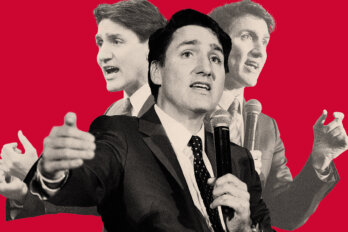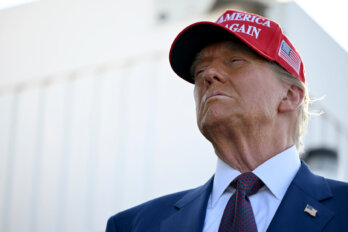After a record number of Indigenous MPs elected on Monday, author and broadcaster Wab Kinew writes this letter to his community, his nation, and his country.
Dear fellow members of the Ojibways of Onigaming First Nation,
You did a remarkable thing this past week: you showed up in great numbers to vote and help elect a new federal government in Canada. In fact, so many of you voted that the polling station on the reserve ran out of ballots. Luckily, our local volunteers sent for more from the nearby city of Kenora, Ontario, which arrived just as the last of the first batch ran out. At the same time, other community members began going door to door on the Rez to make sure that as many people as possible exercised their right to vote. In the end, everyone who showed up to vote was able to do so and had their voice heard. This is amazing and you should be proud, especially our local volunteers.
Elections Canada certainly has some explaining to do. A few questions that jump to mind are “Wouldn’t anyone who knows our community expect people to show up even if they hadn’t pre-registered? ” and “Shouldn’t there be enough ballots sent to a polling station for everyone in the community over the age of eighteen? ” Perhaps they will now know to expect us to show up on voting day.
While these questions need to be answered, the media is asking them. But the media is asking because you showed up to vote. This is how it works: Political engagement builds political capital, and political capital means that our concerns and dreams are more likely to be listened to.
Importantly, Indigenous issues played a part in this federal election. You saw this with the mention of a “nation-to-nation relationship” in the victory speech by Justin Trudeau on election night, and when he and other party leaders promised an inquiry into missing and murdered Indigenous women. A little over a year ago no one seemed to pay attention to that issue. Now it is in the mainstream Canadian public sphere: a testament to the hard work of many Indigenous women. Our former government’s intransigence on these issues helped to cement the image in the minds of many that it did not reflect Canadian values. In much the same way you did, Canadians showed up en masse to reject the divisive direction of the former government and instead embraced a more positive, inclusive vision for this land.
Obviously things are not perfect. In this the year of the final report of the Truth and Reconciliation Commission of Canada I would have liked to see a more substantial discussion of the report’s recommendations and the issues confronting our community. We know full well the many challenges that confront Indigenous people in our community: underfunded schools, lack of opportunity, suicide, prescription drug abuse, and difficulty getting governments to pay attention to our concerns. But perhaps things are beginning to change. And as we keep engaging with the rest of Canada we will soon be able to say with confidence the era of ignoring First Nations, Métis, and Inuit communities in this country is over.
I hope as you cast your ballot you thought of our parents or grandparents who still remember not having the right to vote in this country. I sure did. It has been a long journey but we are now beginning to find our political muscle.
Some in our community may worry that voting means compromising our identity or sovereignty as part of the Anishinaabe nation. But our nation’s strength comes from being out on the land in our traditional territory, speaking our language, and practicing our culture. I’ve voted in every election since I was eighteen and I have not seen it interfere with my identity.
We stood up to defend those things as part of the Idle No More movement, motivated by the Harper government’s plan to legislate away our Aboriginal and treaty rights. In 2013 we may not have succeeded in beating Harper with protest, but in 2015 you showed up to vote his candidates out of office and were successful. You beat him at his own game.
This is about more than just rejecting one party though. Push further and you see this is more broadly about a love for our community, hope for our children, and a desire to protect our land. When those things were threatened you stood up to defend them.
Let’s now use that same motivation to do what we can about the challenges that confront our community and to reach the potential that exists within us. This year we sent many of our young achievers away to school in Toronto, Winnipeg, and Sudbury, among other places. Let’s work together so that in a few years every young person in Onigaming finishes high school and goes on to post-secondary. Let’s push for more opportunity so everyone who wants to work can find a job. And let’s continue to practice our culture, speak our language, and live free on our territory as Anishinaabe people.
Voting is just a small piece of the puzzle when it comes to achieving those goals. But perhaps that work will go a little easier now that we have a government in Ottawa that says it is willing to be a good partner with us. And of course it does not end with voting: We have to hold this new government to account and make sure they follow through on their promises to provide equal funding to First Nations schools, call an inquiry into missing and murdered Indigenous women, and implement all ninety-four recommendations of the TRC report.
This is just the beginning. More of the country is listening to us. Let’s keep the momentum going. Keep voting. And in the words of my friend Ryan Mcmahon, keep being Anishinaabe.
Apichii miigwech ndinawemaaganag, gigichi-inenimininim. Thank you my relatives, I am beyond proud of you.—Wabanakwut





